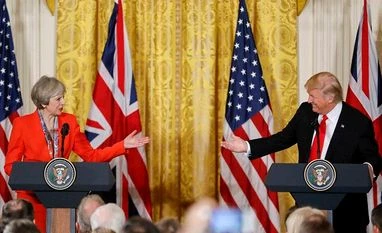Theresa May’s visit to the US as the first foreign leader to meet President Donald Trump has prompted much pondering about how the “special relationship” will fare in a new world order, in which past and precedent have been cast aside. One thing is certain – the characters involved mean it now needs to take on a less romantic tinge.
When Winston Churchill first coined the phrase back in 1946, the idea of the special relationship was simple, and found strength in a long history of transatlantic associations. From English settlement of the New World in the 17th century, to the more recent experiences of the world wars, there was more than enough to confirm a “special” closeness between the United States and United Kingdom. In fact, in the years before and after Churchill’s appeal, much had been written on both sides of the Atlantic about the nature of this unique tie.
For some, it was a product of shared language and culture. For others, especially in the early 20th century, it was a bond made of blood and biology: independent nations united by membership in the same “Anglo-Saxon family”.
But there was always another reading of the Anglo-American alliance – one which saw it tied to a romantic love. Churchill (himself a product of an Anglo-American love match) was very susceptible to this idea, famously declaring that he had purposefully set out to “woo” Franklin D Roosevelt. In late 1941, this “courtship” would even lead to an Anglo-American “marriage” ceremony on the decks of HMS Prince of Wales.
Such ideas of Anglo-American courtship and love were equally popular in wartime and post-war cinema. From A Yank in the RAF (1941) to The Way to the Stars (1945) to D-Day: Sixth of June (1956), the Anglo-American alliance was frequently examined and celebrated via special relationships of the heart.
Notably, the dynamics of these love matches increasingly corresponded with the realities of contemporary transatlantic relations. As the United States became the “dominant” partner in the “relationship”, so too did fictional Americans increasingly out-compete their British love rivals for the hands of their British sweethearts. Of course, it was just such competition that famously strained the Anglo-American alliance during the war itself. The problem with the Yanks, so went the British wartime complaint, was that they were “overpaid, overfed, oversexed and over here”.
This romanticised and occasionally sexualised special relationship continued to receive attention – and criticism – in the late 20th century. When, at the height of the 1980s Cold War, a famous poster criticising the alliance between Ronald Reagan and Margaret Thatcher depicted the two in their own version of Gone with the Wind. Reagan, the B-movie actor, sweeps into his arms a swooning Thatcher. In the background, nuclear armageddon unfolds.
More recently, Tony Blair’s relationship with George W. Bush was often dismissed as that of a submissive “lapdog” in thrall to a dominant master. It was just this idea that later led Richard Curtis to offer a very different vision of Anglo-American relations. In his 2003 film Love Actually, Hugh Grant’s prime minister rediscovers his assertive manhood after a bullying American president makes sexual advances towards a member of his staff.
In the hands of Curtis, this insult to British womanhood is quickly remedied by Grant’s grandstanding at a press conference: his “girl” has been groped, and he mans up to hit back. In the film version of the special relationship, an act of misogyny paves the way for an improved era of “manly” Anglo-American relations.
But in the real world, the relationship is playing out rather differently now. As May meets Trump, more than seven decades of ideas and images celebrating a romanticised special relationship collide with an unpredictable president who is on record as having said things which, at best, are grossly misogynistic, and at worst constitute an admittance of sexual assault. During his election campaign, Trump revealed his misogyny further, once dismissing his opponent, Hillary Clinton, as a “nasty woman”.
No such issue was at stake in the era of Thatcher. Reagan, for all his faults, was a careful diplomat and an ideological ally.
To be sure, Trump will have conducted himself during May’s visit just as protocol and precedent demands – and there can be no suggestion of physical impropriety. But regardless, with this commander-in-chief, there can be little place left for the old language of transatlantic courtship and love.
As women march in America and beyond to protest infringements on their basic rights, as American funds for international abortion charities are withdrawn, and as misogyny is institutionalised in the Oval Office, it’s time to drop the pretence that there’s Anglo-American romance in the air. The relationship will no doubt continue, but the love is lost.
Sam Edwards, Senior Lecturer in History, Manchester Metropolitan University
This article was originally published on The Conversation. Read the original article.
To read the full story, Subscribe Now at just Rs 249 a month
Already a subscriber? Log in
Subscribe To BS Premium
₹249
Renews automatically
₹1699₹1999
Opt for auto renewal and save Rs. 300 Renews automatically
₹1999
What you get on BS Premium?
-
Unlock 30+ premium stories daily hand-picked by our editors, across devices on browser and app.
-
Pick your favourite companies, get a daily email with all news updates on them.
Full access to our intuitive epaper - clip, save, share articles from any device; newspaper archives from 2006.
Preferential invites to Business Standard events.
Curated newsletters on markets, personal finance, policy & politics, start-ups, technology, and more.
Need More Information - write to us at assist@bsmail.in



)